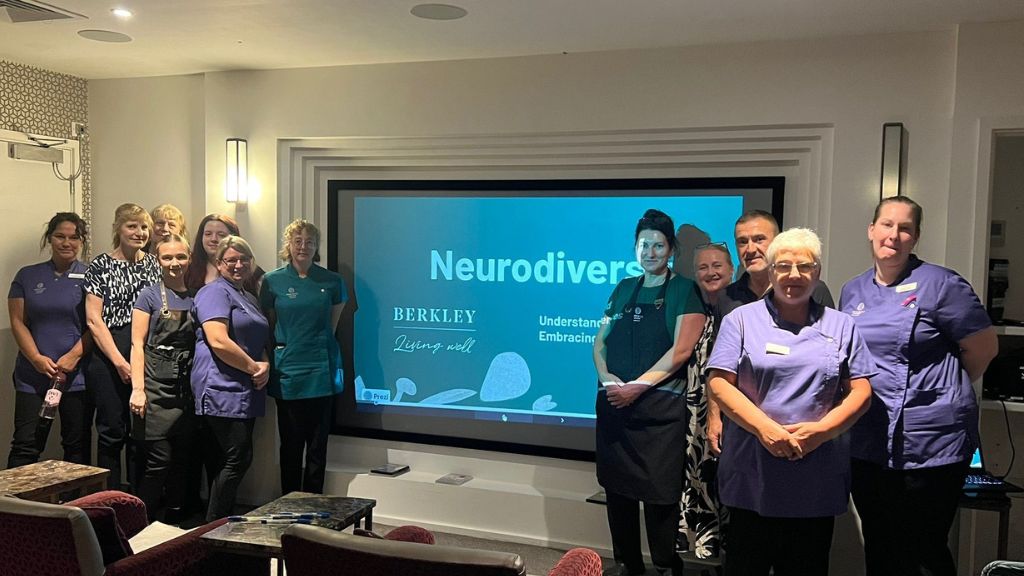Leader’s spotlight: Living well today and thriving tomorrow

Recently appointed chief executive Laura Taylor explains how Berkley Care Group helps its workforce to live well today and thrive tomorrow.
During a difficult workforce climate, with a sector vacancy rate of 10%, or 152,000, and turnover of 28%, care home operators are having to think of new ways of attracting and retaining staff.
Clariane-owned luxury care home operator, Berkley Care Group, is not immune to the workforce challenges facing the sector with a vacancy rate of 10% and turnover rate of 35%, although this varies from home to home.
Taylor shares with Caring Times some of the innovative measures Berkley Care Group is taking to tackle the challenges of recruitment and retention.
Neurodiversity
Berkley Care Group has identified supporting neurodiverse people as a key means of better retaining existing staff and attracting new workers. A survey by the business found 30% of staff members had a diagnosis or identified as being neurodiverse with an even larger proportion knowing someone who was neurodiverse.
“We have developed our neurodiversity strategy and have set up a steering group, and have identified themes around recruitment, culture, communication and awareness,” Taylor explains. “We will have working groups in our homes contributing to that and will start looking at setting some targets around recruitment and retention and accessing the government’s Access to Work funding.
Access to Work
Access to work funding is money for employees to help them do their job if their have a disability or health condition. It can help pay for practical support with a team member’s work as well as support with managing mental health at work. From a practical support perspective this could be a job coach, a travel buddy, specialist equipment and assistive software, or the costs of travelling to work if an employee cannot use public transport. Some neurodiverse conditions such as ADHD, dyslexia and autistic spectrum disorders may mean that an employee qualifies for Access to Work funding. Berkley’s neurodiversity strategy aims to help employees or future employees to access this funding if they’re eligible.
“If people identify as neurodiverse we look at what we can do to support them,” Taylor explains. Practical support is provided to neurodiverse people through assistive technology such as speech to text functionality within Berkley’s e-care planning tool.
“Each individual’s support needs will be unique to them, so it may be that someone needs to take more frequent breaks throughout their work day or we may look to assign specific responsibilities to a team member to maximise their strengths and capabilities,” Taylor adds.
The care provider also encourages an open and inclusive culture where all team members have a basic understanding of neurodiverse conditions by providing training and information.
In terms of recruitment, Taylor and her leadership have identified a number of simple changes to make Berkely more accessible to candidates.
“We have looked at things such as providing candidates with the interview questions before the interview,” Taylor highlights. “An interview should not be a memory test with people having to work under pressure. It’s really a competency process. There’s nothing wrong with allowing someone to prepare.”
The luxury care home operator has innovated to make the interview process less formal and intimidating. Video interviews are used to support those intimidated by the formality of the conventional interview, as well as catering for people with dyslexia who struggle with written applications.
Berkley has also adopted ‘walk and talk’ interviews as an informal way of introducing candidates to the work environment.
At the induction and training stage, the care provider offers support tailored to meet the needs of the person, whether that be through providing a buddy, more face-to-face training, or breaking down the induction into smaller more manageable chunks based on the person’s self-assessment of their own training needs.
Taylor says Berkley is keen to increase awareness of neurodiversity with other providers and share its expertise. “Talking about it a huge factor in promoting awareness,” she adds.
Nurse leadership programme
Innovations in training and development have also helped support recruitment and retention at the business with the introduction of the Berkley Nurse Standards of Practice and Education programme in July last year.
The programme is aligned with the Standards in Practice and Education for care home nurses developed by the Queen’s Nursing Institute and supports the move towards specialist practitioner qualification status for registered nurses working in adult social care.
Upon completion, nurses become part of the clinical governance group within Berkley and can explore additional career pathways, with the potential to develop advanced practitioner skills or further hone their leadership skills. This could see nurses filling future general and clinical manager roles across Berkley’s portfolio of homes or becoming part of the wider quality team. The first cohort of eight nurses on the programme graduated in June this year.
“We have had such positive feedback from those who took part,” Taylor says. “It’s created a clinical community to share knowledge and best practice, peer-to-peer support and competency assessment sharing, and most importantly, helped people improve their confidence and being able to cope with new situations in a care home context.”
Taylor says Berkley wanted to extend the programme beyond qualified nurses to care practitioners.
“We have care home advanced practitioners and senior carers who are a really important part of our workforce,” she says. “They are very skilled individuals and we want to really raise their profile as providers of clinical care and connect them together and put them on a learning and development programme.”
The aim is to provide a rich career pathway for employees who can join as a care assistant with little experience and work their way up to becoming a senior carer or an advanced practitioner. The initiative chimes with the ethos of France-based parent company Clariane, which invests in its workforce through the Clariane University. The institution brings together all training courses offered by the group to its employees, both in-house and with partner schools and institutes.
Taylor says the longer term vision for Berkley is to apply the university’s principles in the UK by offering a physical space for learning and development.
Reward and recognition
As well as offering career development opportunities, Berkley, seeks to attract staff through its competitive reward and recognition policies.
“Our aspiration will always be to be ahead of the Minimum Wage,” Taylor says. “As the Minimum Wage goes up that gap may erode a little bit which is why we then invest in other benefits for our employees to retain them in the business.”
As well as seeking to offer a competitive salary, Berkley also focuses on the things above and beyond the hourly rate such as paid breaks and offering a hot cooked meal on every shift.
Taylor says: “Reward and recognition is really key through our Be Appreciated Programme. We also celebrate staff through our annual staff awards programme, long service awards and employee of the month so that we can improve quality of life and so that we can help our staff to live well today and thrive tomorrow. Healthy and happy staff make great care.”



